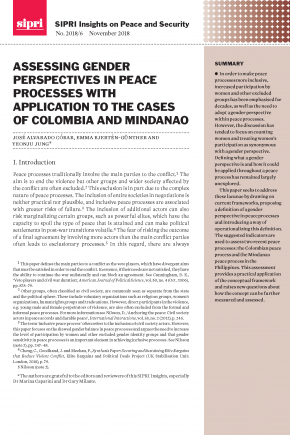Assessing Gender Perspectives in Peace Processes with Application to the Cases of Colombia and Mindanao
In order to make peace processes more inclusive, increased participation by women and other excluded groups has been emphasised for decades, as well as the need to adopt a gender perspective within peace processes. However, the discussion has tended to focus on counting women and treating women’s participation as synonymous with a gender perspective. Defining what a gender perspective is and how it could be applied throughout a peace process has remained largely unexplored.
This paper seeks to address these lacunae by drawing on current frameworks, proposing a definition of a gender perspective in peace processes and introducing a way of operationalizing this definition. The suggested indicators are used to assess two recent peace processes: the Colombian peace process and the Mindanao peace process in the Philippines. This assessment provides a practical application of the conceptual framework and raises new questions about how the concept can be further measured and assessed.
I. Introduction
II. Background
III. Assessing gender perspectives in peace processes
IV. Unpacking gender perspectives in the cases of Colombia and Mindanao
V. Concluding discussions



